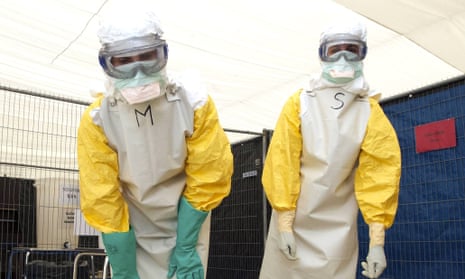You are more likely to be struck by lightning this year (one in 960,000), killed by your dog (one in 11mn) or win the lottery than you are to die from Ebola.
Ebola is terrible. But three cases do not a national crisis make.
An election, however, is always a crisis. And the first rule of a political crisis is to look like you’re doing something.
Three weeks out from a US midterm election, Republicans and Democrats have both worked to make a political catastrophe for their opponents out of the western media’s hysteria in response to Ebola – which health experts believe could reach 10,000 new cases a week by December ... in West Africa.
Fox example, take Republican congressman Tom Price of Georgia – a physician representing us here in suburban Atlanta, minutes from the Centers for Disease Control – who criticized the Obama administration right after it named Ron Klain the new “Ebola czar” to coordinate the national response:
Rather than putting another person in charge, President Obama needs to task every agency already involved in this crisis – those with real medical expertise and crisis management – with reviewing existing policies and protocols to determine what’s effective, what’s ineffective and what more should be done to stop the expansion of the Ebola outbreak abroad and protect Americans here at home.
Except that putting another person in charge is exactly what Republicans demanded in the days leading up to Klain’s appointment. Senator John McCain called for a coordinating czar last week, as did several other Republicans – including Senator Jerry Moran of Kansas.
Moran’s call for a czar came despite a long record of opposing Obama administration czars as a symbol of federal overreach and wasteful spending. No matter. It’s a crisis. An election is upon us, and Ebola is on television. Do something.
So Moran responded to the appointment by describing Klain as a mere political operative with a title undeserving of the post he demanded the administration create:
This is a real crisis and worthy of an individual with extensive background in international diplomacy, experience coordinating large-scale interagency missions, as well as a proven ability to work with Congress and across the aisle.
Klain isn’t a doctor. He’s a lawyer. He’s not there to tell physicians how to scrub – he’s there to be invited to hearings he doesn’t want to go to and yelled at by guys like McCain and Moran and eventually blamed for whatever goes wrong. I can think of no better fate for a Washington attorney.
The need to do something – anything – about Ebola also turned political orthodoxy on its head, with partisan charges and countercharges about how poorly the CDC has been funded and by whom. Rep Jack Kingston (R-GA), who had been running for the US senate this year on a platform of reducing government, took to local television to assert that “whatever they’re asking for, we in Congress are giving it to them, just recently $30m to the CDC, $58m to [the Biological Advanced Research and Development Agency] to try to develop vaccines.”
But where was that money last year – or any of the years before? Francis Collins, director of the National Institutes of Health, told the Huffington Post last week that the NIH had been working on Ebola vaccines since 2001. “Frankly, if we had not gone through our 10-year slide in research support, we probably would have had a vaccine in time for this that would’ve gone through clinical trials and would have been ready.”
Spending on Ebola vaccine research fell from $37m in 2010 to $18m in 2014 – forcing the NIH to shelve a quarter of its grants on Ebola research, according to the Washington Post.
Republicans have been quick to note that the Obama administration’s budget for 2013 and 2014 cut spending for the CDC, but that Congress boosted it above the budget request – calling foul on Democratic campaign ads highlighting reduced expenditures. They have been less eager to note that spending has fallen in both nominal and real dollars for most of the last decade, largely as a function of general budgetary intransigence instigated by Republicans. (That’s the sort of thing that led to the fiscal cliff and the grand compromise of the sequester, which cut federal budgets by 10 percent across the board.)
Ebola is not coming to kill you – though the nonstop speculative hysteria about it on television might sting. The tragedy today is how it takes the perception of a crisis for policymakers to treat public health like a serious issue.
